Table of Contents
- Best website builder tools for eCommerce stores
- Best CRM tools for eCommerce
- Best SEO tools for eCommerce
- Best website analytics tools / best website UX tools
- Best social media marketing tools for eCommerce
- Best content marketing tools for eCommerce
- Best email marketing tools for eCommerce
- Best customer service tools for eCommerce
- Final thoughts
Is running an eCommerce business profitable? You bet. But to reap its many potential rewards, you must market well.
But here’s the tricky part: eCommerce marketing is a challenge in and of itself.
Given the complex online landscape modern buyers are navigating, your potential customers are constantly moving targets. To reach and engage prospects in ways that lead to sales, it’s critical that you equip yourself with the right eCommerce marketing tools.
Trying to decide which eCommerce marketing tools can take all day. To help you out, we’re listing all eCommerce marketing tools to successfully run and grow your business online.
We even sorted our list into categories for your convenience:
- Best website builder tools for eCommerce stores
- Best CRM tools for eCommerce
- Best SEO tools for eCommerce
- Best website analytics tools / best website UX tools
- Best social media marketing tools for eCommerce
- Best content marketing tools for eCommerce
- Best email marketing tools for eCommerce
- Best customer service tools for eCommerce
- Final thoughts
Let’s get started!
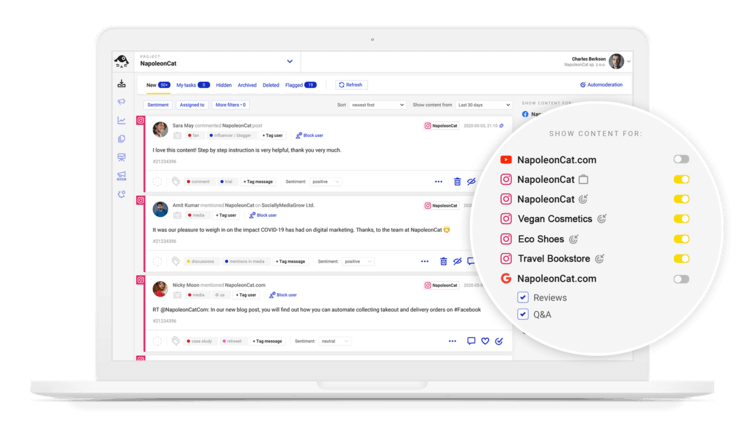
Simplify Social Media Management
with One Tool
- Manage & reply to comments and DMs in one place.
- Monitor ad comments from multiple accounts.
- Automate answers to repetitive questions.
- Schedule posts to multiple accounts, on desktop.
- Analyze performance and monitor hashtags.
- Keep track of your competition.
- Create or schedule in-depth reports in seconds.
Best website builder tools for eCommerce stores
Without design and coding skills, you’ll be hard-pressed to build an eCommerce store that attracts buyers and makes the buying process effortless.
If you want to create a visually appealing website with built-in eCommerce features with the least amount of time and effort, use an excellent website builder tailored for eCommerce stores.
Here are some of the best website builder tools specifically designed to help you create a user-friendly and conversion-focused eCommerce store.
1. Shopify
Shopify has built a strong reputation as an eCommerce platform. It offers features that make the building and launching of an online store effortless — even if you don’t have design or coding experience.
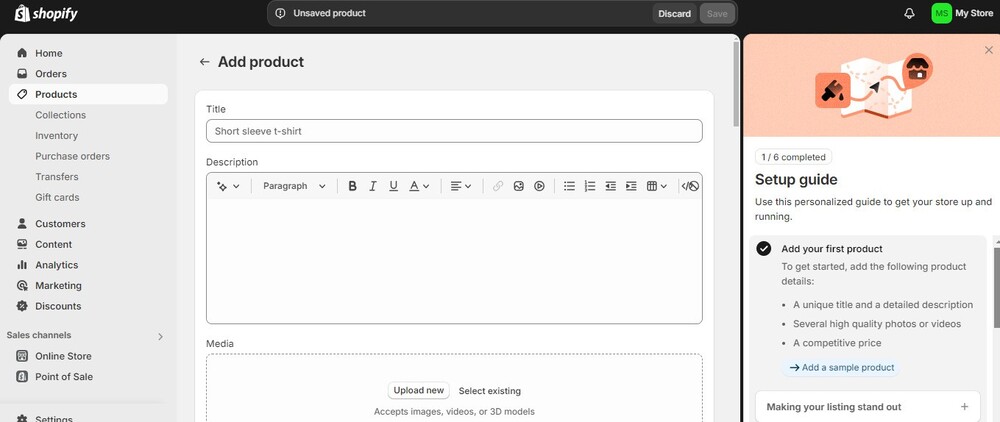
It’s so easy, in fact, that you can build an eCommerce store with Shopify in three simple steps.
First, you choose and customize a theme from thousands of the platform’s ecommerce-enabled options. Next, you add products to your catalog, uploading product photos, writing descriptions, and setting pricing. Finally, you set up your payment and shipping options and launch your store to start selling online.
Key advantages of Shopify as a website builder tool:
- A ton of templates to choose from: Shopify’s website builder tool offers over 200 templates, with 13 of them free. The prices of the paid themes range from $150 to $300. Shopify launches new themes on a regular basis, so you can rest assured you’ll always have fresh and modern design options to choose from.
- Shopify Magic built-in AI tool: Shopify comes with Magic, an AI assistant that offers expert tips and suggestions to help you build a strong eCommerce website with minimal time and effort.
- Robust app store: Shopify offers a bustling app store that features over 8,000 apps and plugins designed to enhance your store’s functionality, from marketing and inventory, to management, customer service, and analytics
2. Wix
Wix makes website building a breeze, especially if you prefer drag-and-drop customization. Thanks to its intuitive interface, extensive features, and wide range of templates, Wix offers a versatile and flexible website builder for business owners and entrepreneurs.
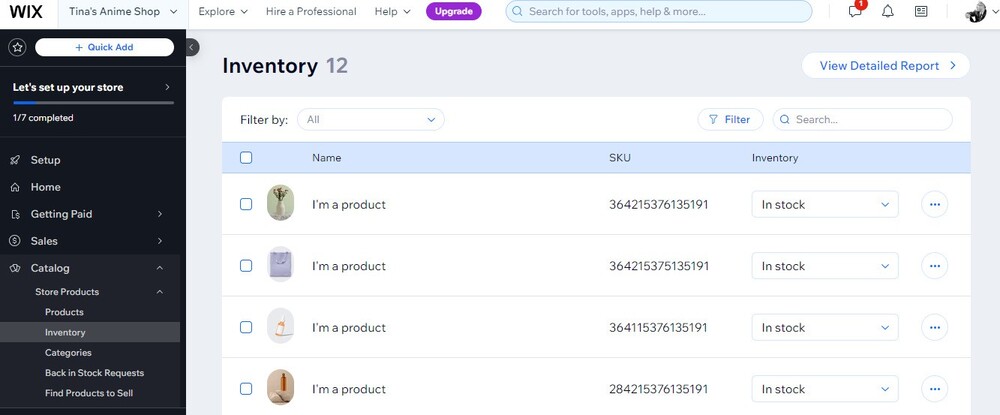
It also doesn’t hurt that Wix offers features and templates tailor-made for ecommerce websites.
Key advantages of Wix as a website builder tool”
- Intuitive drag-and-drop editor: Wix’s drag-and-drop editor gives you the flexibility and greater control to design and customize your store exactly how you envision it, even with zero coding knowledge.
- Over 800 templates: You get a ton of website templates across a wide range of categories. Wix’s ecommerce templates range from fashion, pets, and more, ensuring you find a design that aligns perfectly with your store’s focus.
- SEO-friendly website builder: Wix offers SEO-friendly features that enable you to build websites your target audience can find via search engines. Wix websites are optimized with built-in SEO tools, including customizable meta tags, URL structures, and alt text options, making it easier for your ecommerce store to rank higher in search engine results.
Best CRM tools for eCommerce
To sell more over the long term, you need to build and cultivate a relationship with your prospects and customers.
But for those relationships to translate to sales, you need a CRM tool capable of gathering the sales insights you need to nurture prospects and nudge them towards making a purchase.
Here are the top CRM tools that can help your eCommerce business thrive.
3. Pipedrive
Pipedrive is an excellent CRM tool for ecommerce businesses on account of its sales-centric approach.
With its intuitive pipeline management and robust automation features, you get all the features you need to seamlessly move prospects through each stage of the sales funnel.
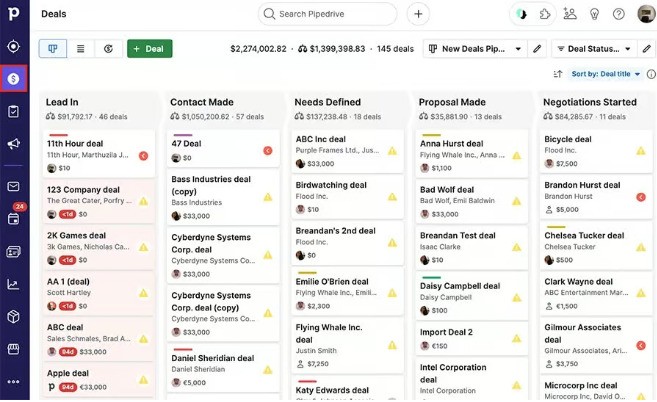
This enables you to close more deals with efficiency and ease.
Key advantages of Pipedrive as a CRM tool:
- Visual sales pipeline: Pipedrive offers a user-friendly visual pipeline that makes it easier to track leads and manage sales activities. You can see the status of each deal with a few clicks, giving you more time to prioritize and focus on the most promising leads.
- Automation of repetitive tasks: Pipedrive lets you automatically send follow-up emails and task reminders, allowing you to nurture prospects with less time and effort.
- Workflow automation: With Pipedrive, you can set up workflows and trigger events to automate the repetitive tasks of running an eCommerce business.
4. Salesforce
Running an eCommerce business involves keeping track of many moving parts, from inventory management to customer personalization to order fulfillment. Salesforce offers end-to-end CRM processes that help you streamline all these tasks.
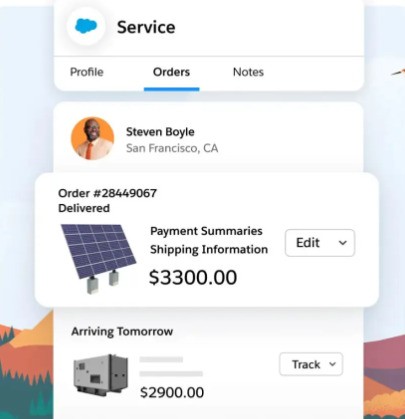
Key advantages of Salesforce as a CRM tool:
- 360 view of all orders: Salesforce offers a unified dashboard that gives you a bird’s eye view of every customer action or interaction across every touchpoint. This puts you in a better position to engage and move prospects through your sales funnel.
- AI built into the CRM: Salesforce uses generative AI technology (called Salesforce Einstein) to offer personalized assistance to help you make data-driven decisions and enhance customer experiences. With Salesforce Einstein built into the CRM platform, you can do away with busywork and focus on the more impactful areas of your eCommerce business.
- Comprehensive lead management system: With Salesforce CRM, managing leads is effortless. Not only can you create leads in a few minutes, you can also add important information such as contact details, communication history, and specific notes — allowing you to focus on leads who are more likely to buy.
Best SEO tools for eCommerce
To attract prospects who are likely to buy your products and services, a solid SEO strategy is critical. After all, the average user performs three to four searches per day on search engines.
But SEO can get complicated. If you find yourself spending so many hours doing manual keyword research, identifying and fixing broken links, and checking for inconsistencies in your use of meta tags, then it’s high time you use an SEO tool that simplifies your efforts.
Here are SEO tools for eCommerce that deserve a look to boost organic traffic to your product pages and generate more sales.
5. Ahrefs
Ahrefs is an all-in-one marketing platform that offers a suite of SEO tools to help you build and optimize an eCommerce website for improved search engine visibility and performance.
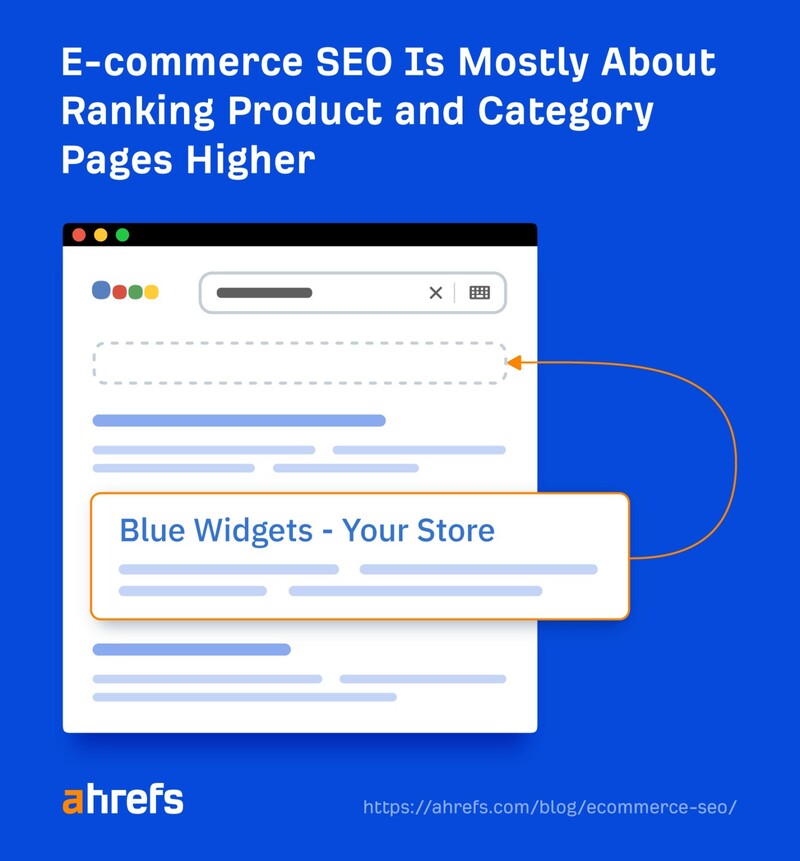
Ahrefs is also known for running its own search engine. It actively crawls the entire web, so much so that it stores petabytes of data every day. With that amount of web data, it’s no wonder 64% of SEO professionals trust Ahrefs’ link data over its competitors.
With Ahrefs, you can efficiently handle technical SEO, keyword research for unique product and category descriptions, on-page SEO, and track unlinked brand mentions. Moreover, it also aids in creating product-led content to boost organic traffic and generate more sales.
Ahrefs’ key advantages as an SEO tool:
- Comprehensive keyword and competitor analysis: Ahrefs’ Keywords Explorer and Site Explorer give you an edge by identifying the best keywords to target and offering in-depth competitive analysis. These tools help you explore your competitors’ backlinks, content strategies, and rankings, giving you valuable insights for your own strategy.
- Content optimization and tracking: With the Content Explorer and AI Content Grader, Ahrefs helps you discover high-performing content, track website mentions and links, and optimize your content using AI to enhance relevance and performance.
- Website auditing and rank monitoring: Ahrefs’ Site Audit and Rank Tracker tools allow you to perform detailed technical audits of your website and monitor its rankings over time. These features help you identify SEO issues, track progress, and make informed adjustments to improve performance.
6. Google Search Console
Google Search Console is every webmaster’s dream SEO tool. After all, it’s Google’s own tool for helping website owners boost their rankings in search results, most particularly on Google.
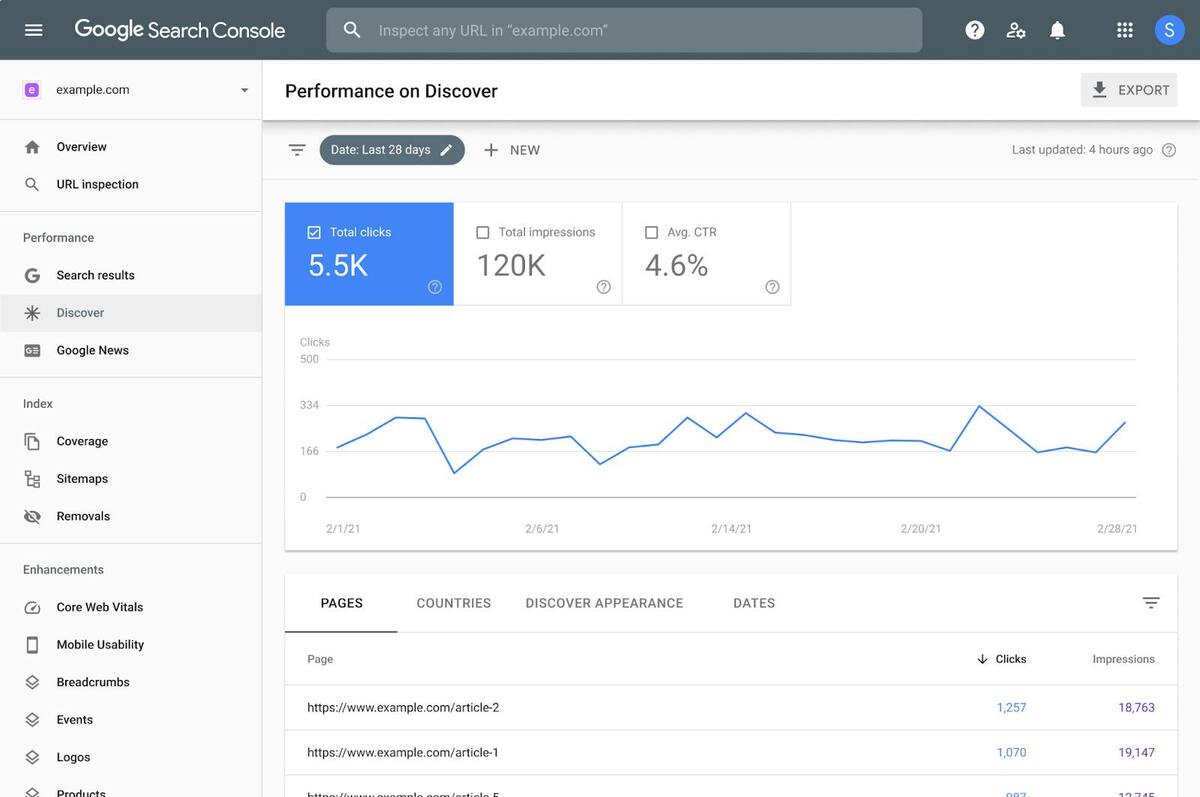
Google Search Console does a lot of things well, including measuring and providing insights into your website’s search traffic, providing detailed SEO reports, and identifying crawl errors.
Considering how eCommerce websites are prone to crawl issues (with so many product pages, it’s not surprising), Google Search Console can help identify and fix issues that might be preventing your product pages from being indexed properly.
Key advantages of Google Search Console as an SEO tool:
- Performance analysis: Provides detailed reports on your website’s performance in Google Search, including metrics such as clicks, impressions, click-through rates (CTR), and average position.
- Crawl error identification: Identifies crawl errors and issues that might prevent search engines from accessing and indexing your pages.
- Index Coverage Report: Shows which pages are indexed by Google and which are excluded.
Best website analytics tools / best website UX tools
If you want your eCommerce business to sell more, give your prospects an easy time when they navigate your online store. If you don’t, you’ll end up among the nearly three-fourths of online businesses that fail due to bad UX.
Creating a user-centric shopping experience is not easy. In their eagerness to highlight products and features they want to push, online sellers easily fall prey to prioritizing their own goals over the user’s needs.
The result? Complicated navigation, slow loading times, and unclear product descriptions.
To get rid of “seller bias” and create eCommerce websites with prospects in mind, using an excellent website UX tool helps. Here are our top picks.
7. Hotjar
Hotjar is a website analytics tool that scans user behavior through heatmaps, session recordings, and visualizations. With these functionalities, understanding how visitors interact with your site and tracking where they encounter friction becomes less complicated.
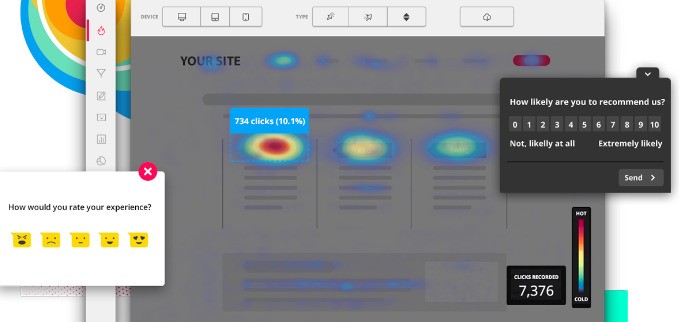
That way, you can make the improvements needed to generate more sales for your eCommerce website.
Key advantages of Hotjar as a website analytics tool:
- Uncover UX issues at a glance: Heatmaps provide a visual representation of where users click, scroll, and hover on your website, allowing you to identify which areas of your page are engaging or being ignored.
- Session recordings: Hotjar’s session recordings capture real-time interactions from users as they navigate your site. This feature lets you see exactly how users interact with various elements, helping you pinpoint areas where they struggle or drop off.
- Customizable surveys: Hotjar offers customizable surveys that can be triggered at key points during a user’s journey. This helps you learn directly from users what they like, what frustrates them, and what improvements they want to see from your eCommerce site.
8. Kissmetrics
Like Hotjar, Kissmetrics helps you track customer behavior and provide you with the insights you need to boost engagement and revenue.
Kissmetrics’s one big advantage is how it simplifies the attribution process. Tracking key metrics from the pre-acquisition stage right down to the post-purchase process can be messy, but with Kissmetrics’s streamlined dashboard, you’ll understand your customers better and make the necessary adjustments to increase sales.
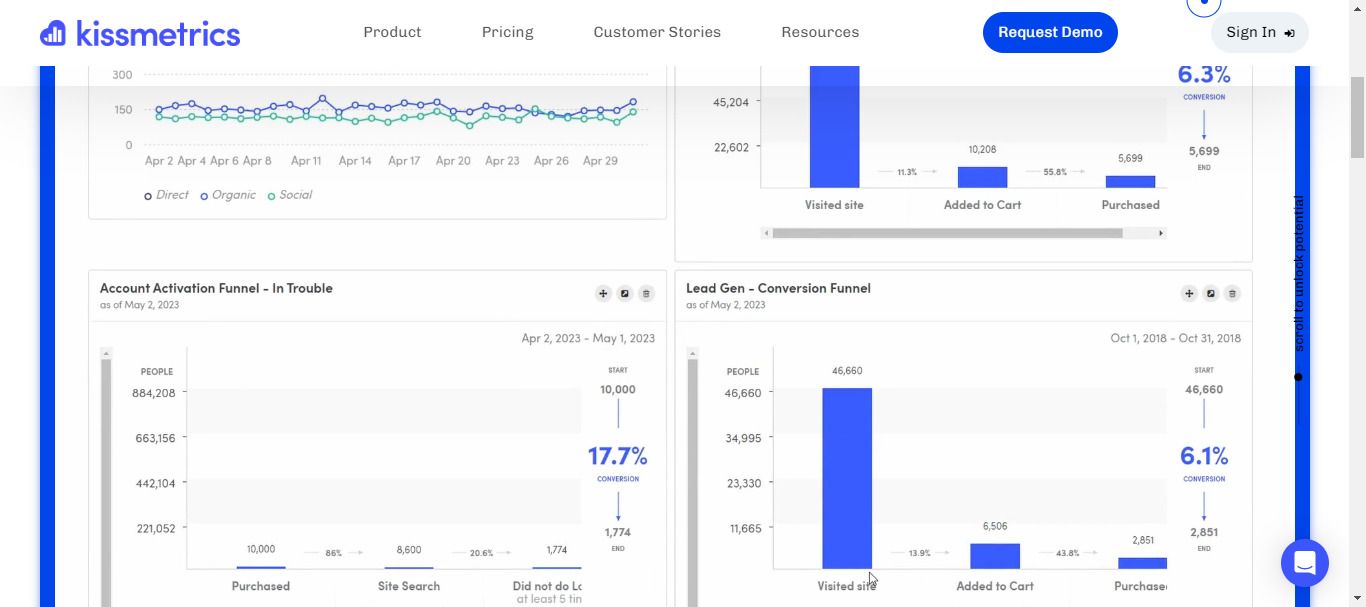
Key advantages of Kissmetrics as a website analytics tool:
- Multi-channel attribution: Every customer journey has its own story, and Kissmetrics tracks user behavior at multiple touchpoints, including social media, search, and more.
- A/B testing: Test every variable of the customer journey from pre-purchase to post-purchase, and use the results to optimize your eCommerce website for sales.
- Email automation: Create automated email campaigns based on user behavior and segment your audience for more targeted and effective communication.

Protect your social media from trolls
Automatically hide or delete comments from Facebook and Instagram trolls under your organic posts and ads, for all your profiles at once – with an all-in-one social media tool.
Best social media marketing tools for eCommerce
Since the pandemic has come and gone, social media has become more than a place where people love to publish selfies and share updates with friends — it’s now a powerful platform for businesses to connect with customers, promote products, and drive eCommerce sales.
In 2023, 106.8 million Americans shopped on social media, and that number is expected to reach 118 million by 2027.
But to sell more products online, you better do more than build a presence on social media. You need to adopt a social media strategy that not only engages your audience but also makes them want to buy, instills brand loyalty, and leverages data to optimize conversions across platforms.
This is why for this section of the article, I’m taking the liberty to recommend only one tool — NapoleonCat. Besides being an all-in-one social media management platform, NapoleonCat helps you build your social media presence in a way that translates to more online sales and revenue for your eCommerce brand.
9. NapoleonCat
At the end of the day, building a successful eCommerce business is about meeting your buyers where they are.
That’s not easy given how modern buyers are now navigating a variety of platforms. This is where NapoleonCat can help.
With NapoleonCat’s suite of social media management tools, you can streamline your social media efforts, ensuring you meet your customers across these fragmented channels while maintaining a cohesive brand presence that drives sales and fosters growth for your eCommerce business.
NapoleonCat’s eCommerce tools make this possible by enabling you to:
- Share product updates on all your social media profiles using one convenient dashboard.
- Respond to customer inquiries and manage reviews in one place.
- Automate your customer service on social platforms (e.g., automate replies to repetitive questions).
- Monitor your performance – and keep an eye on your competitors (and use competitive insights to differentiate your eCommerce brand).
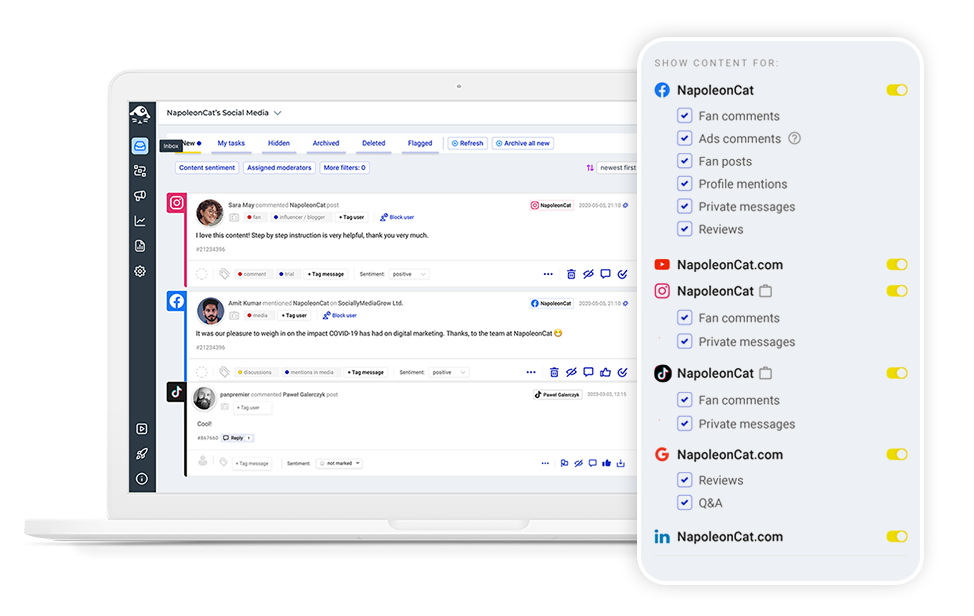
Key advantages of NapoleonCat as a social media marketing tool:
- Handle all social interactions in one dashboard via Social Inbox: By centralizing all your interactions across different social media channels into one place, Social Inbox enables you to track conversations, respond efficiently, and ensure nothing slips through the cracks.
- Schedule posts across social networks via Publisher: NapoleonCat’s Publisher tool allows you to schedule and publish product updates across various social media profiles from a single dashboard, ensuring a consistent brand presence.
- Save time and maintain consistent customer service via Auto-moderation: Automate responses to frequently asked questions, comments, and reviews using NapoleonCat’s Auto-moderation tool.
We highly recommend you test NapoleonCat completely for free – no credit card required 😉
Best content marketing tools for eCommerce
With over 26.5 million online stores operating globally, eCommerce sure is a crowded industry. If you want to convince prospects that your products are the best, you have to earn their trust and create an emotional connection with them.
And what better way to do that than to tell stories? But to tell stories that will resonate with your audience and make them want to keep buying, you need a content marketing strategy.
Great content sells, and here are the top content marketing tools that put you in an excellent position to attract and engage your audience.
10. HubSpot
As an eCommerce marketer or business owner, you must ensure your marketing, sales, and customer service are perfectly aligned.
HubSpot is a customer platform that provides you with the tools and resources to pull that off. It enables you to create personalized content, manage your leads, automate email campaigns, and track customer interactions, all in one place.

Key advantages of HubSpot as a content marketing tool:
- Marketing analytics and dashboard software: HubSpot’s powerful analytics features lets you track and measure the performance of your content in one place — which is a big deal given how customer data is pulled from multiple channels.
- AI-powered content marketing software: HubSpot comes with Content Hub, an AI-powered content marketing software that provides you the tools and resources (e.g., CRM data, AI writer, brand voice software, etc.) to create personalized, on-brand content at scale and consolidate your content strategy.
- Email marketing tools: With HubSpot’s email automation software, you can nurture leads by creating and automating personalized emails based on user behavior. With customizable templates and list segmentation, you can ensure your messages are tailored to specific audience groups for more effective communication.
11. Canva
Without visuals, your content won’t draw and hold the attention of your target audience. Not many people want to read text-only content online.
That’s well and good, but what if you don’t have any graphic design skills or experience?
This is where Canva can help. This popular graphic design tool is a huge blessing for those of us who don’t have a visual creative bone in our bodies. The Canva editor is intuitive enough to make you feel like you know what you’re doing from the get-go.

You also get thousands of customizable templates across different categories, giving you a lot of room to explore and create creative assets that make your content more visually appealing.
Key advantages of Canva as a content marketing tool:
- Tons of customizable templates across different categories: Choose from a wide range of templates, including Instagram Stories, Facebook Stories, posters, and business cards, so you can create professional-looking designs without starting from scratch. You can also customize and edit each template to suit your design needs.
- AI-powered content creation tools: Canva offers a wide range of content creation tools, such as Magic Write (an AI-powered writing assistant) and Magic Switch (an AI-powered tool to convert designs into various formats), to speed up content creation.
- Collaboration features: With Canva Teams, Canva allows team members to collaborate in real-time, making it easy to share designs, provide feedback, and work together on projects,
Best email marketing tools for eCommerce
Email marketing is an effective channel for eCommerce because it enables you to reach your target audience without relying on algorithms or search engine rankings.
Besides, email messages are more likely to convert your prospects into buying — they signed up to your email list, after all.
Running an email marketing campaign can get messy. From managing large subscriber lists to creating personalized content to tracking performance metrics — it never ends.
With the following email marketing tools, you can create and send emails your sales prospects are not only interested in, but also make them want to buy.
12. Mailchimp
By this point, it’s fair to say that Mailchimp is already a household name among marketers. The email marketing platform is so popular, in fact, that it gets over 14,000 sign ups each day!
And why not? Mailchimp offers a wide range of features, including customizable templates, automation tools, and detailed analytics — everything you need to create and launch an effective email campaign.
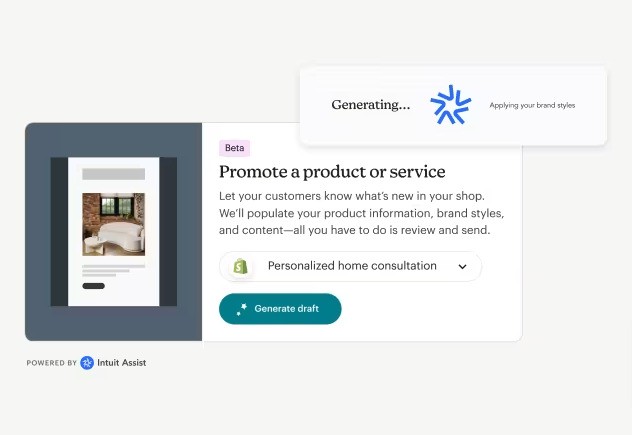
Key advantages of Mailchimp as an email marketing tool:
- Offers hundreds of integrations: Mailchimp helps streamline your email marketing efforts across multiple platforms thanks to its integrations with apps and tools like Shopify, WordPress, and Salesforce.
- Generative AI features: MailChimp recently added Intuit Assist, a suite of AI-powered tools that use generative AI to automate manual marketing tasks, such as drafting emails, generating on-brand designs, and identifying high-conversion customers.
- Advanced segmentation: Mailchimp offers advanced segmentation tools so you can target your prospects at a more granular level.
13. Omnisend
As an email marketing platform tailored for eCommerce businesses, Omnisend deserves to be on this list. For one thing, it offers a ton of features designed to help you create an online store that effectively attracts, engages, and reactivates your target customers.
Thanks to its native integrations to eCommerce platforms such as Shopify, WooCommerce, OpenCart, and Magento, Omnisend allows you to efficiently set up your email marketing workflows. This makes it easier for you to automate email campaigns, segment audiences, and track performance – all in one user-friendly interface.
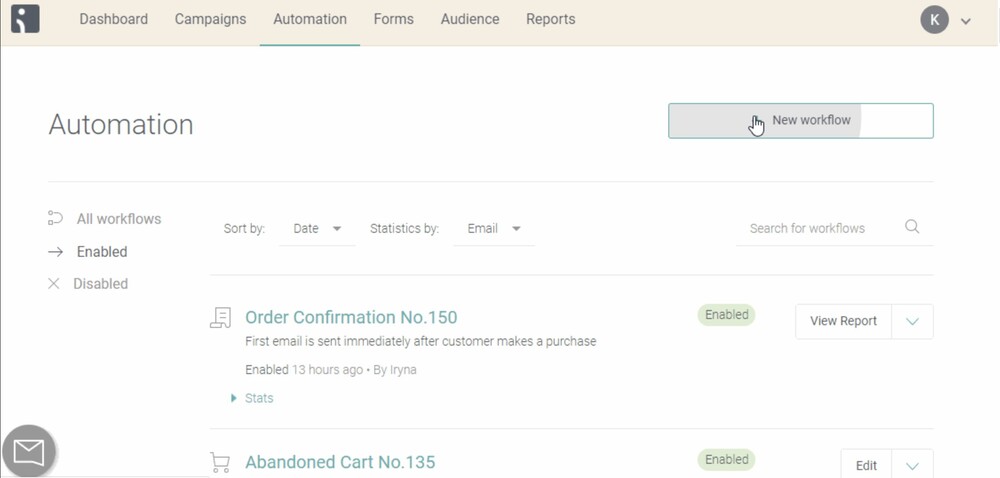
Key advantages of Omnisend as an email marketing tool:
- Automation Library offers prebuilt workflows: Omnisend’s robust automation tools offer a ton of triggers, filters, and conditions so you can set up and manage your email marketing campaigns without the busywork.
- Granular audience segmentation: Segment your audiences based on customer lifecycle stages, on-site behavior, message engagement, and many other variables so you can create email messages that effectively nudge your prospects into buying.
- 350+ email templates: Choose from a wide range of professionally designed email templates, making it easy to create visually appealing and effective campaigns that resonate with your audience.
Best customer service tools for eCommerce
You can’t instill trust and loyalty in your online business if you’re always leaving your customers to fend for themselves. In fact, 77% of consumers say customer service is critical to earning their loyalty and business.
That said, we’re in an era where customers expect quick responses and resolutions. Throw in the lack of face-to-face interactions and the challenges of multi-channel retailing, eCommerce business owners have their work cut out for them when it comes to providing a level of customer service that attracts buyers and keeps them buying.
Thankfully, eCommerce customer service becomes easier with the right customer service tools. Here are two of our top recommendations:
14. Zoho Desk
Zoho Desk is a powerful help desk software that helps you deliver excellent customer support with ease. It allows you to manage tickets, track customer inquiries, and provide multi-channel support — and that’s just for starters.
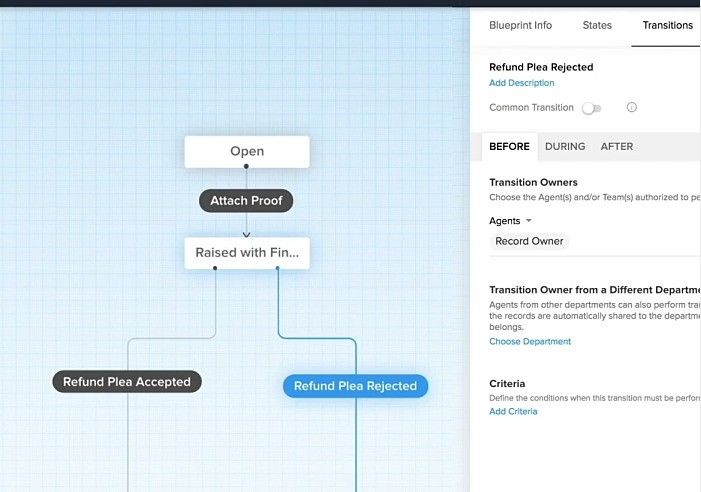
Zoho Desk also helps you do away with busywork thanks to its robust automation features. Throw in its seamless integration with other Zoho products, you get an end-to-end customer service solution that streamlines your eCommerce operations, from customer service to sales and marketing.
Key advantages of Zoho Desk as a customer service tool:
- Advanced process automation: Create a seamless workflow by setting up a sequence of actions (and their corresponding triggers) that enables you to deliver consistent customer experiences no matter how complex the customer inquiry.
- Multichannel support: Address every customer inquiry across various platforms, including email, live chat, social media, and phone, all from a single interface.
- Insightful reporting: Get a clear overview of your team’s performance with detailed reports and analytics. The manager’s dashboard provides key metrics like first response time and average resolution time, which can be filtered by agent, channel, or date.
15. Tidio
If you’re looking for an AI-driven customer service solution that helps you with the most tedious tasks of eCommerce customer service, Tidio deserves consideration.
Its AI tools are so comprehensive that it enables you to address 70% of customer inquiries without human involvement. To top it off, you can easily incorporate Tidio into your tech stack thanks to its impressive list of integrations, which include Shopify, WordPress, Squarespace, WooCommerce, and more.
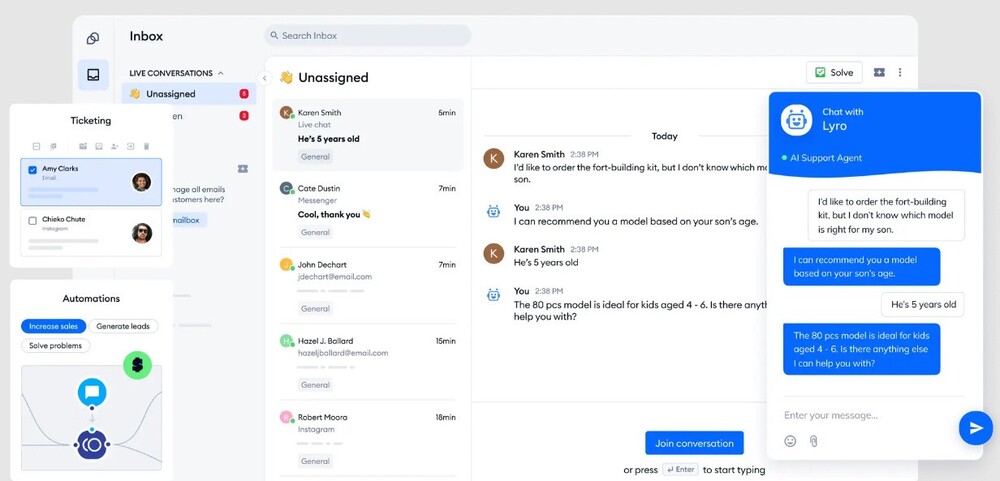
Key advantages of Tidio as a customer service tool:
- AI-driven automation: Tidio’s Lyro AI chatbot can handle the majority of customer inquiries, allowing you to provide support even if your customer service staff is unavailable.
- Seamless integrations: Tidio integrates with over 120 tools and platforms.
- Multi-channel support: Manage customer conversations across live chat, email, and social media via one centralized dashboard.
Final thoughts
The eCommerce landscape is different from how it was decades ago, and it will only keep changing. How customers shop online today will be much different from how they shop in the future.
If there’s one thing that won’t change, it’s buyer psychology. Even as technology like AI, augmented reality (AR), and voice commerce continue to reshape the eCommerce landscape, buyers will always seek convenience, personalization, and authenticity.
Keep these principles at the forefront of your eCommerce marketing strategy to build lasting connections that drive sales. And with the right eCommerce marketing tools at your disposal, everything else falls in place.

Simplify Social Media Management
with One Tool
- Manage & reply to comments and DMs in one place.
- Monitor ad comments from multiple accounts.
- Automate answers to repetitive questions.
- Schedule posts to multiple accounts, on desktop.
- Analyze performance and monitor hashtags.
- Keep track of your competition.
- Create or schedule in-depth reports in seconds.
You may also like:
- Which Social Media Platforms Are The Best for eCommerce?
- What to Post on Instagram: 15 Evergreen Ideas for eCommerce Businesses
- 8 Best Instagram Ad Examples that Drive eCommerce Sales
- Instagram Ecommerce Integrations You Will Love
- 8 Effective Ways to Use Social Media for eCommerce Growth
- 10 Instagram Ecommerce Tools to Boost Your Sales
- Your Guide to eCommerce Automation on Social Media
- Top 9 Facebook Ecommerce Tools to Boost Your Sales
- The Ultimate Ecommerce Marketing Tips Catalog





